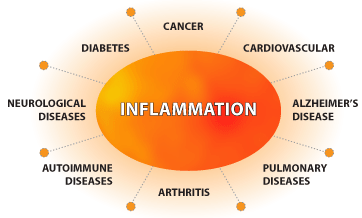 Prevent Inflammation
Prevent Inflammation
Posted 9.3.16 Michael Dole, MD
Low-grade, chronic inflammation occurs when the immune system keeps producing pro-inflammation compounds, even when it doesn’t need to. It can damage different systems in the body and, over time, cause illness: cardiovascular disease, arthritis, asthma, digestive problems and possibly conditions like depression and Alzheimer’s disease.
Health experts are finding that the best ways to prevent and treat inflammation are things that many of us can do on our own. Often it’s related to lifestyle and health habits like smoking, obesity, being inactive, a poor diet and chronic sleep problems. Food sensitivities and environmental factors, like exposure to pollution or other toxins, may also play a role.
Sleeping peacefully
Good quality sleep is crucial, and I will do anything I can to help people get good sleep. It is a way to calm the immune system. If we get enough sleep, the immune system is not so reactive.
To get enough sleep, you should:
limit screen time before bed
keep your bedroom comfortably cool
go to bed at about the same time every night
avoid excessive alcohol and caffeine consumption
consider taking magnesium supplements at bedtime, as these are helpful for some people
With any inflammatory condition, you should be as physically active as you can. Although a condition like arthritis may limit your activities, even stretching is helpful. I’m also a big fan of yoga.
What you eat is important. I recommend that you limit refined carbohydrates and alcohol. Some people may also need to eliminate gluten or dairy from their diet. When inflammation is excessive, I encourage people to try basic diet changes for at least a month.
Certain dietary supplements, as well as fruits and vegetables, have anti-inflammatory properties. These include curcumin, which is found in turmeric. Also, if you take digestive enzymes on an empty stomach, they get absorbed into the blood and work on the inflammatory proteins (called cytokines). Fibrinogen is another protein linked with inflammation and vascular disease, and its levels may also drop simply by increasing the consumption of colorful fruits and vegetables. Reducing red meat consumption may also help because it contains a pro-inflammatory fat called arachidonic acid.
Source: http://www.allinahealth.org/HealthySetGo/article.aspx#!prevent-article-36507246276







